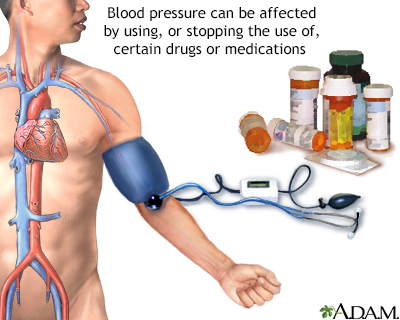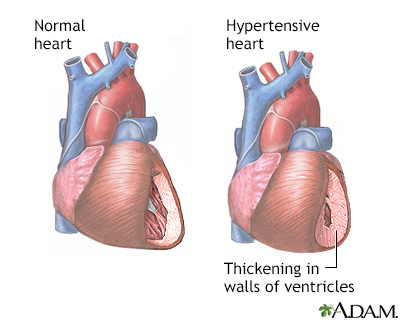High blood pressure - medicine-related
Definition
Drug-induced hypertension is high blood pressure caused by a chemical substance or medicine.
Alternative Names
Hypertension - medication related; Drug-induced hypertension
Causes
Blood pressure is determined by the:
- Amount of blood the heart pumps
- Condition of the heart valves
- Pulse rate
- Pumping power of the heart
- Size and condition of the arteries
There are several types of high blood pressure:
- Essential hypertension has no cause that can be found (many different genetic traits contribute to essential hypertension, each one having a relatively small effect).
- Secondary hypertension occurs because of another disorder.
- Drug-induced hypertension is a form of secondary hypertension caused by a response to a chemical substance or medicine.
- Pregnancy-induced hypertension.
Chemical substances and medicines that can cause high blood pressure include:
- Acetaminophen
- Alcohol, amphetamines, ecstasy (MDMA and derivatives), and cocaine
- Angiogenesis inhibitors (including tyrosine kinase inhibitors and monoclonal antibodies)
- Antidepressants (including venlafaxine, bupropion, and desipramine)
- Black licorice
- Caffeine (including the caffeine in coffee and energy drinks)
- Corticosteroids and mineralocorticoids
- Ephedra and many other herbal products
- Erythropoietin
- Estrogens (including birth control pills)
- Immunosuppressants (such as cyclosporine)
- Many over-the-counter medicines such as cough/cold and asthma medicines, particularly when the cough/cold medicine is taken with certain antidepressants, such as tranylcypromine or tricyclics
- Migraine medicines
- Nasal decongestants
- Nicotine
- Nonsteroidal anti-inflammatory drugs (NSAIDs)
- Phentermine (a weight loss medicine)
- Testosterone and other anabolic steroids and performance-enhancing drugs
- Thyroid hormone (when taken in excess)
- Yohimbine (and Yohimbe extract)

Rebound hypertension occurs when blood pressure rises after you stop taking or lower the dose of a drug (typically a medicine to lower high blood pressure).
- This is common for medicines that block the sympathetic nervous system like beta blockers and clonidine.
- Talk to your health care provider to see if your medicine needs to be gradually tapered before stopping.
Many other factors can also affect blood pressure, including:
- Age
- Condition of the kidneys, nervous system, or blood vessels
- Genetics
- Foods eaten, weight, and other body-related variables, including the amount of added sodium in processed foods
- Levels of various hormones in the body
- Volume of water in the body
Gallery



References
Bobrie G, Amar L, Faucon A-L, Madjalian A-M, Azizi M. Resistant hypertension. In: Bakris GL, Sorrentino MJ, eds. Hypertension: A Companion to Braunwald's Heart Disease. 3rd ed. Philadelphia, PA: Elsevier; 2018:chap 43.
Charles L, Triscott J, Dobbs B. Secondary hypertension: discovering the underlying cause. Am Fam Physician. 2017;96(7):453-461. PMID: 29094913 pubmed.ncbi.nlm.nih.gov/29094913/.
Grossman A, Messerli FH, Grossman E. Drug induced hypertension--an unappreciated cause of secondary hypertension. Eur J Pharmacol. 2015;763(Pt A):15-22. PMID: 26096556 pubmed.ncbi.nlm.nih.gov/26096556/.
Jurca SJ, Elliott WJ. Common substances that may contribute to resistant hypertension, and recommendations for limiting their clinical effects. Curr Hypertens Rep. 2016;18(10):73. PMID: 27671491 pubmed.ncbi.nlm.nih.gov/27671491/.
Peixoto AJ. Secondary hypertension. In: Gilbert SJ, Weiner DE, Bomback AS, eds. National Kidney Foundation Primer on Kidney Diseases. 8th ed. Philadelphia, PA: Elsevier; 2023:chap 65.